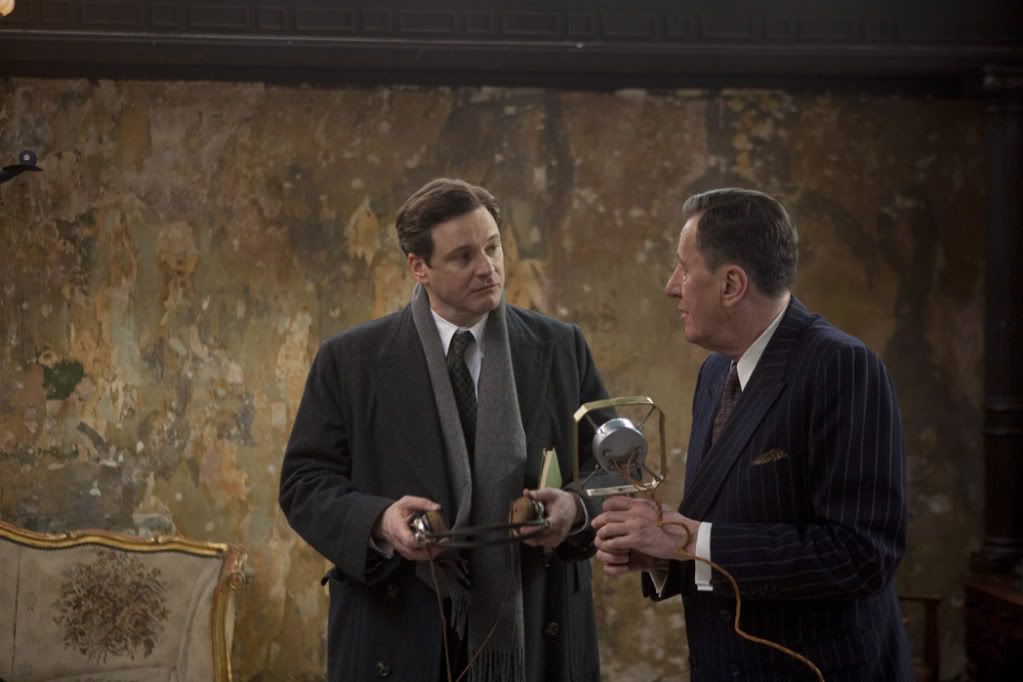
At what point can you separate feelings about the 20th century British monarchy from actually enjoying the damn story? The Queen managed it beautifully, not making its subjects to be saints (in fact they're downright callous). Stephen Frears found humanity in a set of people who are intriguing precisely due to how unknowable they are. The King's Speech, on the other hand, fails to really find that humanity. Put simply, I don't care about the monarchy, but The Queen was still compelling. The King's Speech did not sway me in the slightest.
I was very grateful that they made Winston Churchill a bit toady, even though the movie somehow sent the false message that placing Neville Chamberlain as Prime Minister was somehow a "Strong Statement Against Hitler." In fact I'm generally a bit confused about the chronology of the whole thing, but I won't linger on that. I'm not one who believes that art loses value when it is less than faithful to the truth. (Nor are most people these day, see "Social Network, The.")
The first half of the movie, a family drama where George agrees to humiliate himself and improve his speech, makes sense. He's embarrassed not at his inability to make moving speeches, but to communicate confidently to his family, to his precious daughters. All so well, all so moving. The tension between George and Lionel Logue is powerful and watchable; these are two completely different animals facing off in the cage. But everything goes off the rails as the possibility of becoming King becomes eminent and real, and the drive of the story changes from 'help George to stop stuttering' to 'help George to stop stuttering so he can be an awesome King.'
The problem of the whole thing is motivation. It's a tale of a man finding his 'voice,' but what does finding his voice actually achieve? He's hardly one of the oppressed. He's royalty, for godssakes. All he has at stake is his self-esteem. Gaining his voice only helps him to be slightly better at the job he has by default and cannot actually be fired from; he's a figurehead with an enormous salary who doesn't actually have anything to do at all but make pretty speeches and shake hands. God forbid the monarchy find itself incapable of its symbolic role and find a useful justification for its continued existence and exorbitant salaries.
I've been harping on that point because that's the narrative the movie fixes on: can George learn to stop stammering and what? Govern? No. Make military decisions? No. At one point, the dialogue acknowledges this problem, but the film doesn't attempt to answer it. We are not offered any real insight into why this is so important to George, except that he just can't wait to be King! But why? People want things for a reason, whether concrete, external, or purely internal. But that's not clear here.
I'm not saying I didn't enjoy it, but I can't help but feel that this sort of movie exists as a cynical calculation to win Oscar nominations. I'm also not saying that there isn't a story worth telling in that era of British royalty, but this one isn't it. And I feel truly horrible in thinking that Madonna's upcoming film about Edward and Wallis Simpson will probably be far more compelling (the horror!).
However, I can't be too upset with this movie, I didn't go in thinking it would be anything more than a calculated farce, so I wasn't disappointed. More importantly, how could I stay mad when it had an exquisite moment between Colin Firth and Jennifer Ehle? Nearly two decades later, the chemistry still crackles.
All in all, it's a well-made movie with excellent performances, but it lacks a moving narrative, or at least one with clear motivation and drive. And for GOD'S SAKE will somebody give Guy Pearce a leading role? This is the 5th movie in a row where he shows up for five minutes and disappears.
Perhaps I am a bit harsh, but my feelings are tempered by the fact that the 3/5 of the movies I've seen this week have told stories of people who are not given an honest voice in society, in media or in their lives, and that lack of voice has genuine repercussions. They were not perfect movies, but at least they told unfamiliar stories highlighting fresh perspectives. So perhaps I would have enjoyed The King's Speech more on any other week, but this week, it just felt stale.

